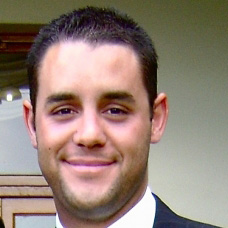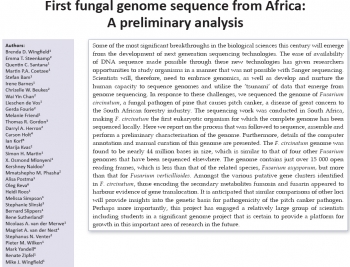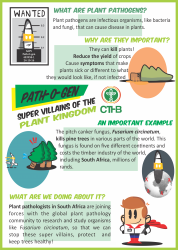Mr Darryl Herron

| PhD student | |
Department |
|
Biochemistry, Genetics and Microbiology |
|
| This email address is being protected from spambots. You need JavaScript enabled to view it. |
My Supervisor/s
| Primary Supervisor | |
| Emma Steenkamp | |
Co Supervisor |
|
| Brenda Wingfield | |
| Mike Wingfield |
My Links
About Darryl
I am a huge fan of stories. It doesn’t matter if the story has been captured in a book, shot on film or delivered on stage, as long as it is captivating. My love for stories and the inspiration they gave me got me–partly–into a career is science. One of the reasons I am here, working toward a PhD in microbiology, is because of the 1995 movie Outbreak, starring Dustin Hoffman and Morgan Freeman.
The story, although fictitious, did give me a little insight into how devastating a pathogen can be. While I didn’t end up battling the deadly Motaba virus, I did use my talents to work on another important pathogen (of pine), a fungus called Fusarium circinatum. During my MSc, I worked with a number of important Fusarium species, eventually describing some of them. When an MSc wasn’t enough, I moved onto a PhD where I now study the potentially harmful Fusarium occurring on grass beneath diseased pine trees.
I hope to gain a better understanding of the role alternative plant species play in the biology and distribution of various devastating Fusarium species, like Fusarium circinatum. The only thing I love more than stories and science is being able to tell some of my own stories. During my postgraduate career, I have been learning to communicate science better. I want to use my storytelling through comics, blogs, posters and popular science pieces to make many more people fans of science. You can follow me on Twitter @LTranslat3d or look for my Facebook page, Loosely Translated.
About my Ph.D:
Fusarium and the Poaceae
Anyone who knows anything about Fusarium will know that this group of fungi is associated with a wide variety of plants, including the grasses (Poaceae). The relationship between grasses and Fusarium is well-known, having evolved over millions of years. The more important fusaria are those that cause disease on commercially important cereals and are well-studied. Many of these studies also look at the role of 'wild' grasses in these systems as alternative hosts for future infections.
It makes sense that a grass Fusarium causing disease on wheat would be found on a wild relative of wheat or a close grass relative, but what about Fusarium species causing disease on woody hosts? Fusarium circinatum, the pitch canker fungus, is a pathogen of Pinus. This pathogen was thought to only infect pine; however, a recent study reported that this pine pathogen could be isolated from wild grass growing in the understory of pitch canker infected Pinus radiata. A couple years after this study, F. circinatum was reported from another five grass species, including maize.
It is a rarity to find a Fusarium pathogen of woody plants on a grass host. Since 2001, only three species of Fusarium have been found on both grass and a woody plant, two of these belong to the Fusarium graminearum species complex — notorious for grass associated fusaria. F. circinatum belongs to the Fusarium fukikuroi species complex (FFSC) that also encompasses some grass associates.
My PhD will look at the role grasses play as alternative hosts for Fusarium and establish the relative importance of this overlooked and underrated group of plants as alternative hosts for some of the world's most important Fusarium pathogens of woody plants.
Conferences

Herron DA, Kvas M, Wingfield BD, Wingfield MJ, Steenkamp ET. 2011. Characterization of Fusarium diversity from forestry nurseries in South Africa. Proceedings of the 47th Annual Congress of the Southern African Society for Plant Pathology, 23-26 January 2011, Kruger National Park, South Africa (Poster)
Herron DA, Rodas CA, Wingfield BD, Wingfield MJ, Steenkamp ET. 2013. Novel Fusarium species in the Gibberella fujikuroi species complex associated with diseased Pinus in Colombia. Proceedings of the 48th congress of the Southern African Society for Plant Pathology, 21-24 January 2013, Klein Kariba, Limpopo, South Africa (Oral)
Herron DA, Steenkamp ET, Wingfield BD, Wingfield MJ. 2016. Hiding in plain sight: the pitch canker fungus from grasses in Limpopo, South Africa. Proceedings of the 50th congress of the Southern African Society for Plant Pathology, 16-19 January 2017, Champagne Castle, Drakensberg, Kwa-Zulu Natal, South Africa (Poster)
Herron DA, Steenkamp ET, Wingfield BD, Wingfield MJ. 2017. Hiding in plain sight: the pitch canker fungus from grasses in Limpopo, South Africa. 7th Forestry Science Symposium, 18-20 July 2017, Pietermaritzburg, Kwa-Zulu Natal, South Africa (Poster & Power Talk)
Herron DA de Beer W, Wingfield MJ. 2017. Plant Clinics in the Anthropocene. 7th Forestry Science Symposium, 18-20 July 2017, Pietermaritzburg, Kwa-Zulu Natal, South Africa (Power talk)
Herron DA, de Beer ZW, Slippers B, Wingfield MJ. 2018. More "Ideal Plant Clinics" (IPC) required in the Anthropocene. 11th International Congress of Plant Pathology (ICPP), 29 July- 3rd August, Boston, MA, USA. (Poster)
Herron DA, Steenkamp ET, Wingfield BD, Wingfield MJ. 2018. The pitch canker fungus (PCF), Fusarium circinatum: endophytic on grasses in South Africa. 11th International Congress of Plant Pathology (ICPP), 29 July - 3rd August, Boston, MA, USA. (Poster)
Talks presented
"Grass: A good place to start... well anything" Forestry and Agricultural Biotechnology Institute, University of Pretoria, Pretoria, South Africa. 25 February 2014.
"Hiding in plain site" Forestry and Agricultural Biotechnology Institute, University of Pretoria, Pretoria, South Africa. January 2015.
"Hiding in plain 'site'" 26th Annual meeting of Tree Protection Co-Operative Programme (TPCP), University of Pretoria, Pretoria, South Africa. 19 May 2015.
"Fusarium circinatum and grass: a needle in a haystack" Forestry and Agricultural Biotechnology Institute, University of Pretoria, Pretoria, South Africa. 20 August 2015.
"Plants don't get sick... or do they? Why is it important?" UPwithScience, University of Pretoria, Pretoria, South Africa. 22 August 2015.
"Poaceae: a family filled with Fusarium" Forestry and Agricultural Biotechnology Institute, University of Pretoria, Pretoria, South Africa. 18 February 2016.
"Escaping the Ivory Tower - Feedback" Forestry and Agricultural Biotechnology Institute, University of Pretoria, Pretoria, South Africa. 26 September 2016.
Awards

Best paper at the 48th meeting of the Congress of the Southern African Society of Plant Pathology (SASPP), 21 - 24 January, 2013.
Mentorship Award from the Forestry and Agricultural Biotechnology Institute (FABI), for my contributions to mentorship and FABI goals. November 2013.
3rd Place Speaker received for my talk "Diet rapidly and reproducibly alters the human gut microbiome" at the #FAMEclub short science communication presentation series. November 2015
Best student publication in 2015 received for my paper "Novel taxa in the Fusarium fujikuroi species complex from Pinus spp.". Awarded by FABI. November 2015.
FABIan of the year award which is awarded to a student in FABI who has show research excellence, commitment to the FABI team, contribution to activities in FABI — outside of their degrees, etc. for the year 2015. November 2015.
2nd Place Speaker received for my talk "Culturing the unculturable" at the #FAMEclub short science communication presentation series. August 2016.
Getting the message to the public received for my contributions to science communication and community engagement. Awarded by FABI. November 2016
Best personal website received for my personal student website on "www.fabinet.up.ac.za" Awarded by FABI. November 2016
John and Petakin Mildenhall award, awarded by the Southern African Society for Plant Pathology (SASPP) to a PhD student who has shown academic excellence and potential in the field of plant pathology. January 2017.
Runner Up, FAMElab regional heats. UNISA, Pretoria, South Africa. 3 March 2017
Young Science Communicators Competition, Open Category, Highly Commended, awarded by SAASTA for a poster entered into the open category, titled "Food Security". May 2017.
Journal clubs

#FAMEclub, Forestry and Agricultural Biotechnology Institute, University of Pretoria, South Africa
Debate Club, Forestry and Agricultural Biotechnology Institute, University of Pretoria, South Africa
Diagnostic Clinic Journal Club, Forestry and Agricultural Biotechnology Institute, University of Pretoria, South Africa
My Science Communication

Guerilla Tree Warfare, Science Today, 14 November 2016 - Click Here
Food Security Poster, SAASTA, 2017 - Click here
Science societies

SASPP, The South African Society for Plant Pathology - Click here
APS, American Phytopathological Society - Click here
SAIF, Southern African Institute of Forestry - Click here
My Galeries
My Journal Articles
| Publication |
|---|
| Swalarsk-Parry BS, De Vos L, Fru FF, Santana QC, van der Nest MA, Wingfield BD, Wingfield MJ, Herron DA, Ramaswe JB, Dewing C, Sayari M, van der Merwe NA, van Wyk S, Lane FA, Wilson AM, Adegeye OO, Soal NC, Price J-L, Steenkamp ET. (2024) Wide variation in aggressiveness and growth in South African Fusarium circinatum isolates with geographical origin as the primary determinant. Southern Forests: a Journal of Forest Science
10.2989/20702620.2024.2363749 |
| Herron DA, Wingfield MJ, Fru F, Wingfield BD, Steenkamp ET. (2020) Grasses as a refuge for Fusarium circinatum L. – evidence from South Africa. Southern Forests: a Journal of Forest Science 82(3):253-262.
10.2989/20702620.2020.1813649 |
| Herron DA, Wingfield MJ, Wingfield BD, Rodas CA, Marincowitz S, Steenkamp ET. (2015) Novel taxa in the Fusarium fujikuroi species complex from Pinus spp.. Studies in Mycology 80:131-150.
10.1016/j.simyco.2014.12.001 |
 Wingfield BD, Steenkamp ET, Santana QC, Coetzee MPA, Bam S, Barnes I, Beukes CW, Chane W-Y, de Vos L, Fourie G, Friend M, Gordon TR, Herron DA, Holt C, Korf I, Kvas M, Martin SH, Mlonyeni XO, Naidoo K, Phasha MM, Postma A, Reva O, Roos H, Simpson M, Slinski S, Slippers B, Sutherland R, van der Merwe NA, van der Nest MA, Venter SNV, Wilken PM, Yandell M, Zipfel R, Wingfield MJ. (2012) First fungal genome sequence from Africa: a preliminary analysis. South African Journal of Science 108:104-122.
10.4102/sajs.v108i1/2.537 Wingfield BD, Steenkamp ET, Santana QC, Coetzee MPA, Bam S, Barnes I, Beukes CW, Chane W-Y, de Vos L, Fourie G, Friend M, Gordon TR, Herron DA, Holt C, Korf I, Kvas M, Martin SH, Mlonyeni XO, Naidoo K, Phasha MM, Postma A, Reva O, Roos H, Simpson M, Slinski S, Slippers B, Sutherland R, van der Merwe NA, van der Nest MA, Venter SNV, Wilken PM, Yandell M, Zipfel R, Wingfield MJ. (2012) First fungal genome sequence from Africa: a preliminary analysis. South African Journal of Science 108:104-122.
10.4102/sajs.v108i1/2.537 |
| Herron D.A, Wingfield M.J, Wingfield B.D, Rodas C.A, Marincowitz S., Steenkamp E.T.. () Novel taxa in the Fusarium fujikuroi species complex from Pinus spp.. Studies in Mycology 80:131–150..
10.1016/j.simyco.2014.12.001. |


